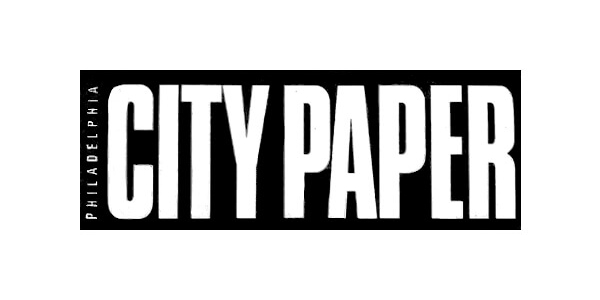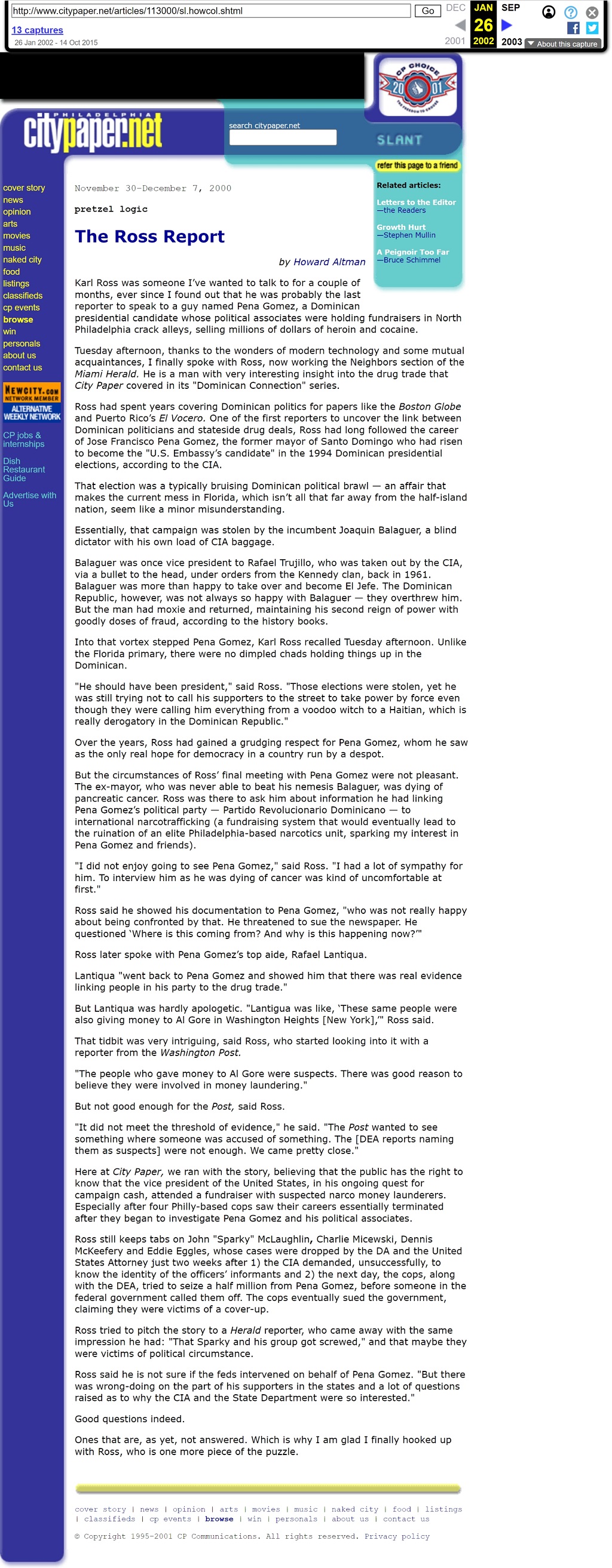Pretzel Logic
Karl Ross was someone I’ve wanted to talk to for a couple of months, ever since I found out that he was probably the last reporter to speak to a guy named Pena Gomez, a Dominican presidential candidate whose political associates were holding fundraisers in North Philadelphia crack alleys, selling millions of dollars of heroin and cocaine.
Tuesday afternoon, thanks to the wonders of modern technology and some mutual acquaintances, I finally spoke with Ross, now working the Neighbors section of the Miami Herald. He is a man with very interesting insight into the drug trade that City Paper covered in its “Dominican Connection” series.
Ross had spent years covering Dominican politics for papers like the Boston Globe and Puerto Rico’s El Vocero. One of the first reporters to uncover the link between Dominican politicians and stateside drug deals, Ross had long followed the career of Jose Francisco Pena Gomez, the former mayor of Santo Domingo who had risen to become the “U.S. Embassy’s candidate” in the 1994 Dominican presidential elections, according to the CIA.
That election was a typically bruising Dominican political brawl — an affair that makes the current mess in Florida, which isn’t all that far away from the half-island nation, seem like a minor misunderstanding.
Essentially, that campaign was stolen by the incumbent Joaquin Balaguer, a blind dictator with his own load of CIA baggage.
Balaguer was once vice president to Rafael Trujillo, who was taken out by the CIA, via a bullet to the head, under orders from the Kennedy clan, back in 1961. Balaguer was more than happy to take over and become El Jefe. The Dominican Republic, however, was not always so happy with Balaguer — they overthrew him. But the man had moxie and returned, maintaining his second reign of power with goodly doses of fraud, according to the history books.
Into that vortex stepped Pena Gomez, Karl Ross recalled Tuesday afternoon. Unlike the Florida primary, there were no dimpled chads holding things up in the Dominican.
“He should have been president,” said Ross. “Those elections were stolen, yet he was still trying not to call his supporters to the street to take power by force even though they were calling him everything from a voodoo witch to a Haitian, which is really derogatory in the Dominican Republic.”
Over the years, Ross had gained a grudging respect for Pena Gomez, whom he saw as the only real hope for democracy in a country run by a despot.
But the circumstances of Ross’ final meeting with Pena Gomez were not pleasant. The ex-mayor, who was never able to beat his nemesis Balaguer, was dying of pancreatic cancer. Ross was there to ask him about information he had linking Pena Gomez’s political party — Partido Revolucionario Dominicano — to international narcotrafficking (a fundraising system that would eventually lead to the ruination of an elite Philadelphia-based narcotics unit, sparking my interest in Pena Gomez and friends).
“I did not enjoy going to see Pena Gomez,” said Ross. “I had a lot of sympathy for him. To interview him as he was dying of cancer was kind of uncomfortable at first.”
Ross said he showed his documentation to Pena Gomez, “who was not really happy about being confronted by that. He threatened to sue the newspaper. He questioned ‘Where is this coming from? And why is this happening now?’”
Ross later spoke with Pena Gomez’s top aide, Rafael Lantiqua.
Lantiqua “went back to Pena Gomez and showed him that there was real evidence linking people in his party to the drug trade.”
But Lantiqua was hardly apologetic. “Lantigua was like, ‘These same people were also giving money to Al Gore in Washington Heights [New York],’” Ross said.
That tidbit was very intriguing, said Ross, who started looking into it with a reporter from the Washington Post.
“The people who gave money to Al Gore were suspects. There was good reason to believe they were involved in money laundering.”
But not good enough for the Post, said Ross.
“It did not meet the threshold of evidence,” he said. “The Post wanted to see something where someone was accused of something. The [DEA reports naming them as suspects] were not enough. We came pretty close.”
Here at City Paper, we ran with the story, believing that the public has the right to know that the vice president of the United States, in his ongoing quest for campaign cash, attended a fundraiser with suspected narco money launderers. Especially after four Philly-based cops saw their careers essentially terminated after they began to investigate Pena Gomez and his political associates.
Ross still keeps tabs on John “Sparky” McLaughlin, Charlie Micewski, Dennis McKeefery and Eddie Eggles, whose cases were dropped by the DA and the United States Attorney just two weeks after 1) the CIA demanded, unsuccessfully, to know the identity of the officers’ informants and 2) the next day, the cops, along with the DEA, tried to seize a half million from Pena Gomez, before someone in the federal government called them off. The cops eventually sued the government, claiming they were victims of a cover-up.
Ross tried to pitch the story to a Herald reporter, who came away with the same impression he had: “That Sparky and his group got screwed,” and that maybe they were victims of political circumstance.
Ross said he is not sure if the feds intervened on behalf of Pena Gomez. “But there was wrong-doing on the part of his supporters in the states and a lot of questions raised as to why the CIA and the State Department were so interested.”
Good questions indeed.
Ones that are, as yet, not answered. Which is why I am glad I finally hooked up with Ross, who is one more piece of the puzzle.


